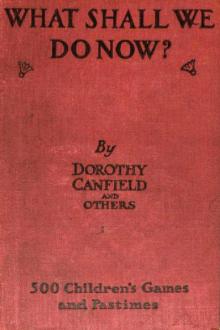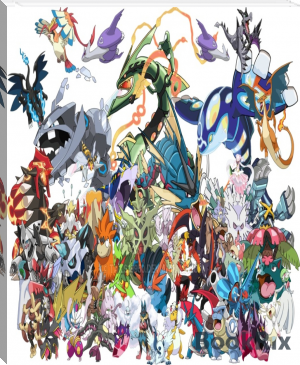What Shall We Do Now? by Dorothy Canfield Fisher (books on motivation .TXT) 📖

- Author: Dorothy Canfield Fisher
- Performer: -
Book online «What Shall We Do Now? by Dorothy Canfield Fisher (books on motivation .TXT) 📖». Author Dorothy Canfield Fisher
Where toys become tedious, games have to be made up; and in making up games no outside help is needed. At the same time, some games which E. H. describes may perhaps supply a hint or two. "One little girl," she writes, "used to find endless joy in pretending to be Douglas bearing the heart of Bruce to the Holy Land. A long stick in the right hand represented his spear; a stone in the left hand was the casket containing Bruce's heart. If the grown-ups stopped to talk with some one they met, or if there was any other excuse for running on ahead, the little girl would rush forward waving her stick and encouraging her men (represented by a big dog), and, after hurling her stone as far forward as possible, and exclaiming, 'Lead on, brave heart,' she would cast her spear in the same direction in a last effort against the Moors, and then pretend to fall dead to the ground." This little girl had found the story of Bruce in Tales of a Grandfather, by Sir Walter Scott. Almost every book will yield people and events to play at.
The Hotel CampsAnother little girl whom E. H. knew "once spent a short time in a hotel, and while there divided the other people into camps according to the floor on which they had rooms. The designs in the windows on the various floors represented the badges or heraldic signs of each camp. For instance, one window (they were of colored glass) had a border with eagles, another had gryphons, another lions, and so on. If she met some one of another floor coming in or going out of the hotel, it represented the meeting of two rival bands. If she actually found herself in the elevator with them, it was a dangerous encounter, in which, if they got out first, she had driven them off the field, but if she got out first it was she who was in retreat. If two people of different floors were seen talking together, a truce had been declared, and so on."
Block CityThe little book called A Child's Garden of Verses, by R. L. Stevenson, has several poems which describe how a lonely little boy used to play. Thus (in "Block City"):—
There I'll establish a city for me,
A kirk and a mill, and a palace beside,
And a harbor as well where my vessels may ride.
Story-Books
And (in "The Land of Story-Books"):—
All in the dark along the wall,
And follow round the forest track
Away behind the sofa back.
All in my hunter's camp I lie,
And play at books that I have read
Till it is time to go to bed.
The Bed Boat
That is ordinary play. There is also a poem describing play in bed:—
Nurse helps me in when I embark;
She girds me in my sailor's coat
And starts me in the dark.
Thinking Games for Bed
When more than one sleep in the same room, the time before sleep can be very interesting. Many games which have already been described are suitable for bed, such as "Telling Stories" (p. 99), "I Love my Love" (p. 88), "Spelling" (p. 166), "The Grand Mogul" (p. 166), "Rhyming Lights" (p. 167), "The Apprentice" (p. 167), "Towns and Products" (p. 168), "Suggestions" (p. 91), and "Clumps," adapted (p. 93).
Games by RoteOn this subject B. R. L. writes:—"We made a list, which was stuck on the wall with a different game for each night. One was 'I Love my Love with an A' (see p. 88), which we steadily made up all through the alphabet. Another was 'Initials,' in which you take turns in saying the initials of people you know, while the other guesses the names. Another was 'Twenty Questions,' in which one thinks of something that has to be guessed as quickly as possible, only 'yes' and 'no' being given as answers. One very girlish game was like this: suppose you had a little girl with golden hair and blue eyes, and she was going on a visit to London, what sort of frocks would you buy her?"
The Imaginary FamilyE. H. recommends for girls the "Imaginary Family" game. This is her description of it:—"First you have to settle the names, ages, and characters of your family, and then you can carry on their adventures every night. One little girl who was devoted to books of travel, and who loved to pore over maps and charts, used to travel with her family every night in whatever country she happened to be interested in at the time. Thus she and a favorite son, Pharaoh, traveled for a long time in California, crossing every mountain-range by the proper passes, exploring every valley, tracing each river to its source, and so on. In the same way she traveled with her family is Central and South America, the Malay Peninsula, and the South Sea Islands. Another little girl who was very fond of adventure stories carried her family through all sorts of perils by land and sea. At one time they were shipwrecked and lived like the Swiss Family Robinson. At another time they were exploring Central Africa, and traveled about with three years' supplies in a gigantic caravan with fifty elephants. Yet another little girl had for her family any characters out of books that particularly fascinated her. Thus, when she was reading The Heroes, her family was reduced to one daughter, Medea, a rather terrible daughter, who needed a great deal of propitiating, and for whose sake all other children had to be given up. Later on, when the same child was reading Tales of a Grandfather, her family consisted of three sons, Wallace, Bruce, and Douglas. (It is rather a good thing, by the way, to have a very heroic family, especially if you are at all inclined to be afraid in the dark, as they help to keep one's courage up.) Two little girls, who lived in a clergyman's household, had an imaginary poor family they were interested in, and they planned about them every night,—how much the father earned, what their rent was, whether the mother oughtn't to take in washing, whether the eldest girl could be spared to go into service, and so on. When they weren't allowed to talk at night they carried the family history on independently and compared notes in the morning."
Making PlansMaking plans is always interesting, but particularly so just before Christmas, when presents have to be arranged for.
For Getting to SleepThe favorite way is to imagine that you see a flock of sheep scrambling through a gap in the hedge, and to count them. A variety of this is a desert with a long train of camels very far off, coming slowly near, and then passing and gradually disappearing in the far distance. Counting a million is also a good way.
Games for ConvalescentsA good thing to do in bed when getting better from an illness is to cut out pictures for scrapbooks. Any kind of cutting out can be done, as the scissors and paper are very light and do not, therefore, tire the arms. "Patience" (see page 76) is also a good bed game, because it needs very little thought.
Bed SoldiersIn A Child's Garden of Verses there is a poem called "The Land of Counterpane," which tells what a little boy did when he was ill, lying among the pillows with his toys:
I watched my leaden soldiers go,
With different uniforms and drills,
Among the bed-clothes, through the hills;
All up and down among the sheets,
Or brought my trees and houses out
And planted cities all about.
China Animals
Dolls are, of course, perfectly at home in bed when you are ill, but there is even more interest in a menagerie. On this subject it would be difficult to do better than quote from a letter from E. M. R., who has 590 china animals, mostly in families and all named. She began this magnificent collection with a family of monkeys.
The mother was called Sally, her eldest son Mungo, the next Pin-ceri, another, eating a nut, Jock, and the youngest, a sweet little girl monkey, Ness. I was soon given a family of three foxes, Reynard, Brushtail, and Whitepad, and from that time to the present my collection has been growing. I soon had enough to fill a shelf in a cabinet, and I turned my doll's-house into a boarding-school for the little animals with a big pig as headmaster. But when my collection rose to 400 animals, I had too many children to be all boarders at the school, so some had to be day-scholars, and the headmaster was changed to a green frog who swam beautifully, and who was assisted by two swans, a duck, a fish, two crocodiles, and a seal, who all swam. Another frog taught the children swimming by tying a piece of string round their bodies, and dangling them in the water from the edge of a basin.
The animals' abode was now changed, and they were put into a large cabinet containing six small shelves and one big one.
I called the big shelf a town, and the rest villages. The town was called Weybridge: the village where the birds lived, Airsbury; and that where the dogs were, Canistown. The rest had various other names. At this time an important addition was made to the collection, for a big lion was given me, which I immediately created king; then came a queen and four princesses, and shortly after a crown prince, another prince, and three more little princesses.
The royal family was allowed a village all to itself, which was called Kingston, and was given five servants, two nurses, a footman, a housemaid, and a cook.
As I had now two families of several of the kinds of animals, I determined that they should be married, so, nominating Sally's husband rector, I had several weddings. I built a church with some bricks I had, and formed a procession up the aisle, to the Wedding March, played on an American organ.
First came the bride and bridegroom, then the best man and the bridesmaids, and last the children of the animals who were to be married, two and two. When the ceremony was over, I marched them all back to their places on the shelf.
I now made eight laws, and copied them out in an exercise-book, together with the names of all the animals, the number of men, women, boys, and girls, and the number of married and single families.
I had had several little separate china animals given me, belonging to none of my families, so I made a law that if any family of their kind came to the collection they must adopt these little orphans.
I also made two acting companies, one of big animals, and one for the children, with a boar-hound called Sir Philip of Ravenswood for the manager of the first, and a little black and white kid, named Tim, for manager of the second,





Comments (0)